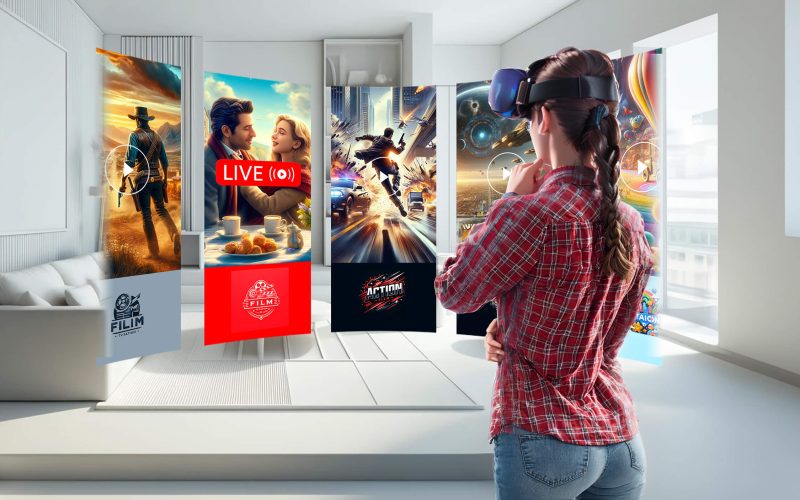Introduction
Augmented reality (AR) has evolved from a futuristic concept to a transformative technology that is reshaping the entertainment industry. By overlaying digital elements onto the real world, AR enhances the way people experience entertainment, making it more interactive, immersive, and dynamic. From video games to live concerts, movies, and theme parks, AR is creating new possibilities and changing the way audiences engage with their favorite content.
What is Augmented Reality?

Augmented Reality is a technology that overlays digital information such as images, sounds, and other data onto the real world through devices like smartphones, tablets, and AR glasses. Unlike Virtual Reality (VR), which creates a completely immersive virtual environment, AR enhances the real world by adding digital elements to it. This unique capability makes AR particularly suited for applications in entertainment.
The Evolution of AR in Entertainment

Image by: Google.com
The journey of AR in entertainment began with simple applications such as Pokémon GO, which demonstrated the potential of AR to create engaging and interactive experiences. Since then, the technology has evolved significantly, influencing various facets of the entertainment industry, including gaming, movies, live events, and even theme parks.
-
AR in Gaming
One of the earliest and most successful applications of AR in entertainment has been in the gaming industry. Games like Pokémon GO and Harry Potter: Wizards Unite have captivated millions of players worldwide by blending the virtual and real worlds. These games use AR to place virtual characters and objects in real-world environments, creating a unique and interactive gaming experience.
Moreover, AR is being used to develop more sophisticated games that offer richer and more immersive experiences. For example, AR-based escape room games allow players to solve puzzles and complete missions in their own living rooms, turning everyday spaces into interactive game environments.
-
AR in Movies and Television
The film and television industry is also leveraging AR to create more engaging content. AR can be used to enhance storytelling by adding interactive elements to movies and TV shows. For instance, viewers can use AR apps to access additional content, such as behind-the-scenes footage, character backstories, and interactive maps, while watching a movie or TV show.
AR is also being used in the production of movies and TV shows. Directors and producers can use AR to visualize complex scenes and special effects during the filming process, making it easier to plan and execute intricate shots. This not only enhances the quality of the final product but also makes the production process more efficient.
-
AR in Live Events
Live events, such as concerts and sports events, are another area where AR is making a significant impact. AR can be used to enhance the live event experience by adding interactive and immersive elements. For example, concertgoers can use AR apps to access additional content, such as song lyrics, artist information, and interactive light shows, during a live performance.
In sports, AR can be used to provide fans with real-time statistics, player information, and interactive replays during a game. This not only enhances the viewing experience but also makes it more engaging and informative.
-
AR in Theme Parks
Theme parks are also embracing AR to create more immersive and interactive experiences for visitors. AR can be used to enhance rides and attractions by adding digital elements to the physical environment. For example, visitors can use AR apps to interact with virtual characters, solve puzzles, and complete missions while exploring a theme park.
Moreover, AR can be used to enhance the overall visitor experience by providing interactive maps, real-time information, and personalized recommendations. This not only makes it easier for visitors to navigate the park but also enhances their overall experience.
The Future of AR in Entertainment

The future of AR in entertainment looks promising, with the technology continuing to evolve and improve. Advances in AR hardware, such as AR glasses and headsets, are making it easier for users to access and interact with AR content. Moreover, improvements in AR software and content creation tools are making it easier for developers to create high-quality AR experiences.
As AR technology continues to advance, we can expect to see even more innovative and immersive applications in the entertainment industry. From interactive movies and TV shows to immersive gaming experiences and enhanced live events, AR is set to transform the way we experience entertainment.
Conclusion
Augmented Reality is revolutionizing the entertainment industry by creating immersive and interactive experiences that were previously unimaginable. From gaming and movies to live events and theme parks, AR is enhancing the way we experience entertainment and offering new and exciting possibilities for the future. As the technology continues to evolve, we can expect to see even more innovative and engaging applications of AR in the entertainment industry.












